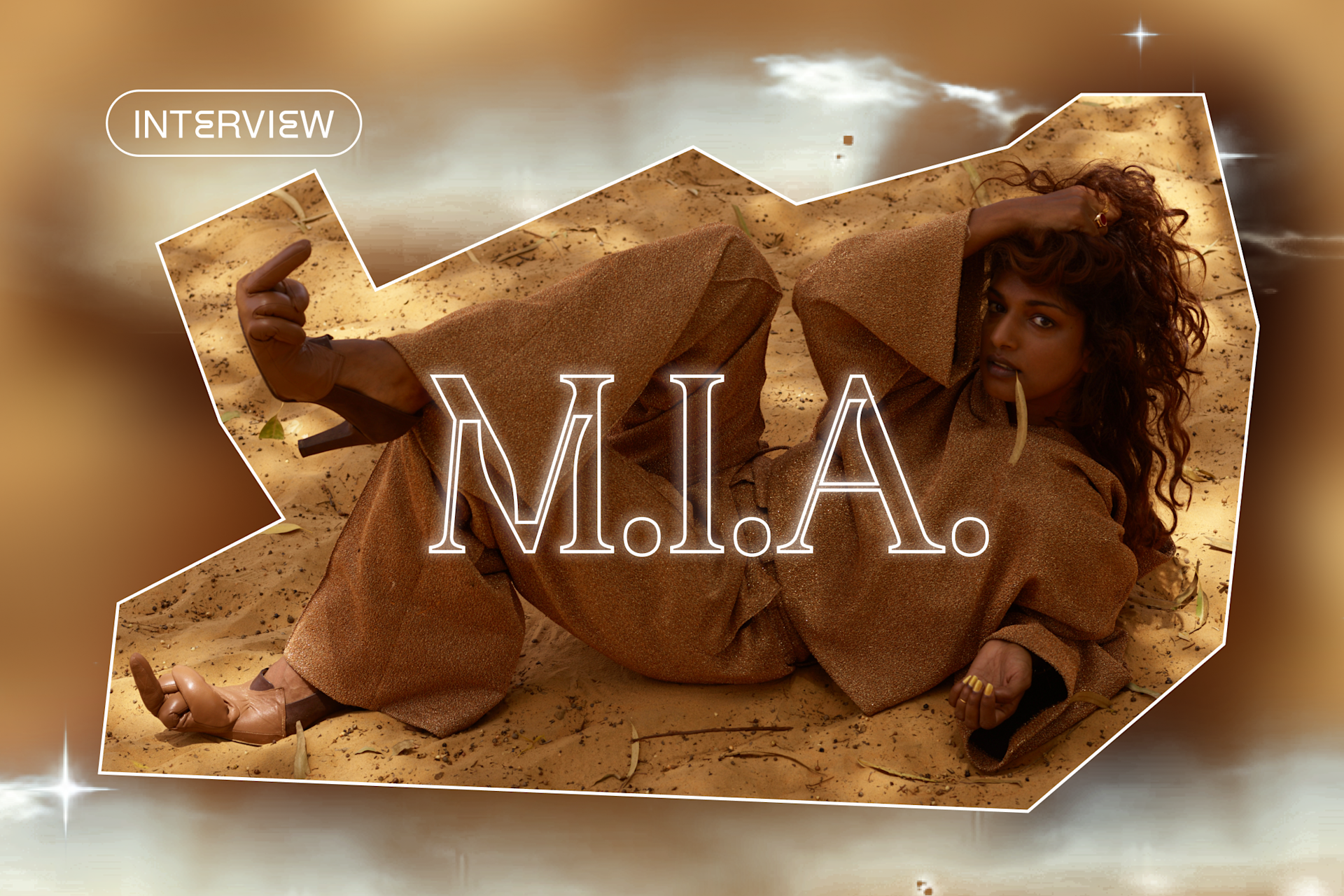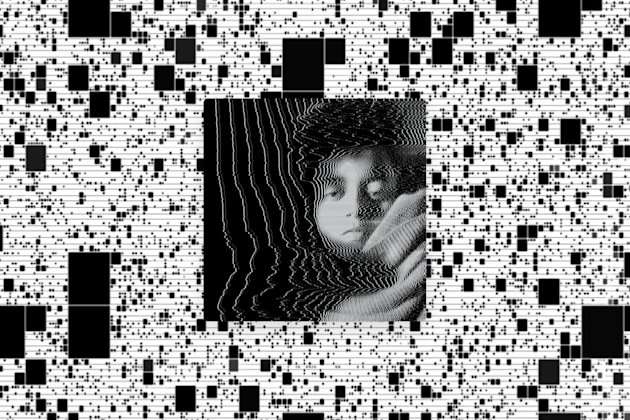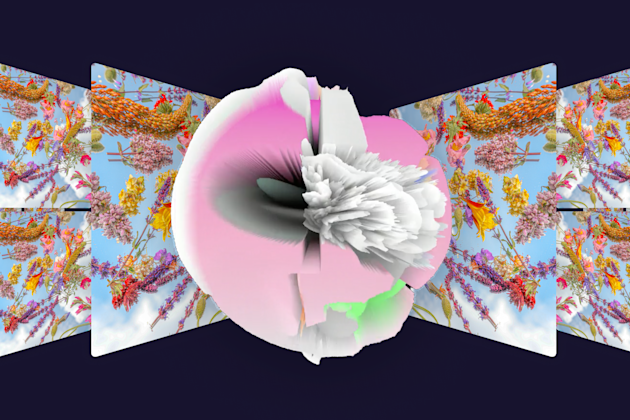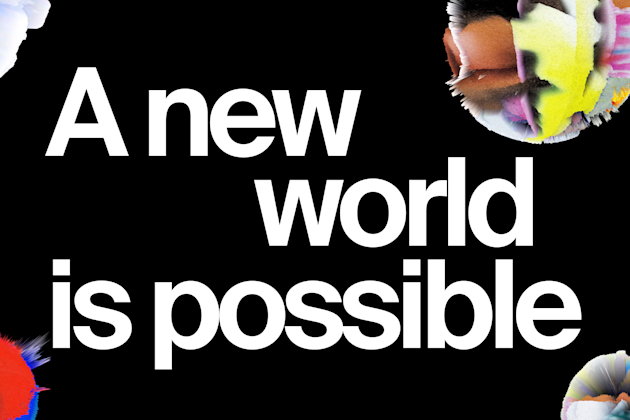M.I.A. is extremely online.

M.I.A.’s roots as an artist are firmly planted online. The first day she was introduced to the internet as a concept changed her life forever—and unleashed her creativity in a way that has rippled through culture for decades. The internet enabled her highly collaborative and global creative approach, from the visual identity of her projects and websites to the sounds embedded within her music. Without the internet, M.I.A. wouldn’t exist.
These days, she’s fighting against the ways in which technological efficiency and hyper-optimization control our lives and the creative process, like through Spotify—ever heard of it? To her, that’s what the world needs less of right now. Which is why she’s fully embracing NFTs as a vehicle to shake up our current ways of being, to challenge the institutions of art, and to dig further into the ways that a decentralized web can lead to creative liberation.
For her entrance into the NFT space, she’s releasing work from her art school days, when she first experimented with digital production. Her future plans include bringing the world of OHMNI, a collective she’s organized of international artists bridging the ancient with the modern, into NFTs.
We interviewed M.I.A. about the future of the internet and what role artists will play in building it.
Why did you choose GIFTY_1 and GIFTY_2 as the first pieces to mint? Why is it important to you that they are here as NFTs?
I wanted to reference the timescale and evolution of GIFs using my own work. I started with these works that were made in the mid-90s because that's when GIFs became a medium of expression. I realized that within my own work, I had something that dated back to those days. GIFTY_1 was recorded in 1997. I also wanted to enter into the NFT space with work from the era when I was studying to be a visual artist, before I was a musician.
What was going through your mind as you were making those pieces?
At the time, Steve Loveridge and I were studying for degrees in fine art, with a focus on film and video, at Central Saint Martins. We wanted to rebel against the institution and experiment with computers—no one had one back then. So we started making basement videos on the weekends and editing them on the new computer at Steve’s mom's house. I remember the first time he showed me the computer and was like, “I want to introduce you to this concept: the internet.”
That day, Steve also introduced me to Photoshop and my mind was blown. I remember reading a Tamil name in the Photoshop credits, Seetharaman Narayanan, and that was enough to get me hooked. We didn’t quite grasp what the internet was, but we both knew that we were going to make interesting things with it. What we were doing was very simple, in GIFTY_1, we were trying to practice green screens with Photoshop, but we couldn't afford a green screen so we used the blue garage door instead.
I wanted to ask you about the Kala era because that's where the next works you are minting are from. What does that time represent to you?
On Arular, we were just proper GIFing at that point, but Kala is when it was more of a thing. There was a scene in London called “new rave,” which was all about being as loud as you possibly can be and making your eyes really large—it’s pure overstimulation. Also at that time, it was part of culture to be completely unapologetic about how disgusting your aesthetic was on the internet—it was the MySpace days.
A couple years ago, wherever we went in the world, my kid would walk down the street, meet another kid, and they would just go into a Fortnite dance. After, they would walk away from each other, never say anything, exchange numbers, or become friends. It was just a weird thing. The internet felt like that in 2005 because it was cool to meet all of these amazing communities all over the world who suddenly spoke the same language. That’s what the Kala era was: utopia, beauty, and freedom.
The KALA COYN NFT is this psychedelic, utopian work. I just want to feed your eyeballs when you look at it, but it’s not meant to be shocking. It's like when you eat in a Tamil restaurant and everything is so spicy and super intense—that's the vibe I wanted to bring into the work. You know what I mean? I always need that sort of stimulation and that’s what I want to share with people right now. A lot of people are bored and all of the aesthetics on the internet are starting to look similar, so I want to break it up.
What do you think is missing from the NFT space right now?
NFTs make you question the censorship that we face in other areas online. What’s punk about them isn't, “Here's a new technological thing, which adds to this other gadget, and this other thing,” but it's how you use NFTs that should be explored more. Social media has become very restrictive for people and the news is just whatever. Nobody is going to the news to find that pure, communicative, liberating, and punky thing that the internet gave to us at the beginning of 2000s. Back then, the internet brought new communities together without any censorship at all. That’s what’s missing.
I also read on Azealia Banks's Instagram where she said, "Oh, everyone's so prudish on there. We need to see more sex and titties." And I'm like, "No, that's YouTube." Every music video we see is tits and ass. We don't need any more tits and ass in the NFT space. What we need is to explore what art is and what artists do. NFTs should be a place where we explore the outcasts of art. David Rudnick was talking to me about how poetry is actually the outcast of physical art and that's something he wants to see explored more. NFTs should be the place for outcasts, but right now, it's like a battle between the people who just want to project their visions of utopia on the internet.
When Azealia released her NFT, she was also critical about the ways that “decentralization” gets thrown around. I feel like you have more to add to that. What does decentralization mean to you?
I'm not a blind futurist. I don't believe in modernization for the sake of modernization. I believe in the simplicity of human life and nature, as well as giving people the tools to survive. Without the internet, I wouldn't be here. Without a computer, I wouldn't be here. So, I'm not a complete purist, but I know that human beings made this thing, and this thing has to help human beings become better, but not by owning or suppressing what a human ought to be.
For NFTs, as long as it doesn't become this massive financial institution where it becomes more about finance and less about art, humans, and communication—then I think it will be a problem and become a more rigid place. I just feel like it will not have much soul to it. We’re still in the very early days.
A lot of my friends who have spent a lot of time on computers making stuff, they've got an opportunity to make money and put value to something that is often disregarded by society as worthless. The art market established an elitism where you have to drink champagne, schmooze, and rub shoulders with certain people in order to get your art valued, seen, and talked about and a lot of people don't do that, especially nerds and computer nerds who don't have those social skills to just be like, "Hey, look at me! I've arrived!" That's what I like about this scene is that it gives all of those people a chance to shine.
Of course I want to be part of this conversation, but if this conversation goes to a place that's not good for the community, then I would definitely say something and talk about that. The point about nerds is that we overthink all of the time, "Is this good? Is this good for the birds and the trees? Is it good for the future of the blockchain? How does the blockchain feature into all of our lives?” There’s a lot to question around how we can marry the ideas of a digital and organic existence.
As someone who has molded internet culture and been shaped as an artist by the internet, how would you describe the era of it that we're in right now?
There’s a fifty-fifty divide with everything at the moment. It’s difficult. You're asking me at a time where there's a global pandemic, everything is shut down, and people are forced into taking their businesses online when they don't want to. Everything's becoming a tool for control and it's not as fun. All of this has had an impact on culture because culture comes up very quickly and then evaporates. Nothing is taking root. Which is why I think this is a really interesting point for art as well, because you have the old institutions and the old systems of painting, art, and what is perceived as art, and they're going, "Well, we took hundreds of years to develop this and we're not just going to give it up overnight to the NFT world." Then the NFT people are like, "Yeah, we're going to change everything!" So, there's this conversation, but that's also what's happening with humanity itself. We’re at a point where humans have existed for 300,000 years, and it’s not going to happen overnight, but we are changing into these robotic versions of ourselves that are more efficient.
Also now, the internet is a whole thing. Like everything else, it is being reduced, similar to how genres in music are being reduced. Before, you had millions of genres that are now just squashed into one genre: pop. You just have to be fucking popular on YouTube and Spotify. That's it. Yeah, we have genres, but that's changing because people are looking for, "Music to listen to on a Sunday. Music to listen to when you wear yellow socks. Music to listen to when you're eating falafel." The genres are not genres anymore, and the internet feels similar. It’s become a whole thing that I can hold—the internet.
They’re trying to build these systems into every aspect of our lives and that is dividing the world into complete purists who are denying a machine, mechanical dependency, and then others who are embracing the future going, "Well, what's so great about humans anyways?" You have to preserve that.
Artists are always at the forefront of these kinds of conversations to highlight what the debates are. David said that the reason why NFTs are happening and the way they are happening, is almost predetermined by what the art market did over the last fifteen years. They sold it out and devalued their own industry and market by making it about nepotism, shagging the right person, or who you know. Since they made it that way, then something else could come and shake its core very easily because they'd lost the core. The internet itself is like that at the moment, it's a volatile place. There's a massive fight between people who want to keep it the way it is, but it’s all going to change in a way we’ve never seen before. I think this is obviously the most important time we've ever lived through. Sometimes I think about what it’s like to be a teenager right now, or somebody who's 80 who's like, "Whoa. Thank God I don't have to spend too much time in this zone.”
It’s a culmination of everything that has gotten us to this point. There are a lot of talks about how we’re experiencing a cultural renaissance on the internet. What do you think?
It is, and it's so simplified and spiritual, and that’s another thing about all of this that is interesting. I always thought that art was made up of people who are spiritually inclined and didn't have a space to communicate that, but weren't just following a spiritual path that was outright set in stone from the ancient times. Anyone who's born without having such a solid path to follow are searching art to explore that, it's like your meditation, and through that you notice certain things about the world. Everything's just sort of turned up to ten and it's at this moment where it's all going to pop.
So in that sense, maybe it’s not a renaissance? Because when I think of renaissance, it is all about that sort of moment. The church isn't commissioning all of these great artists to paint murals and explore the concept of spirituality and what the messages are, it's different, but it's definitely a moment where people are richer than they've ever been, broker than they've ever been, have the most information they've ever had, to complete censorship that they've ever sort of come across, and a pandemic that no one's ever lived through in their lifetime since the Spanish Flu. All of these things are just turned up to ten and you're like, "Okay, what's next?" We've kind of maximized culture and sold it, and it really is about being reflective and being conscious. This is why Foundation is a really good thing with one-off auctions because you do have to be really conscious about what you create and what you're putting out there. If you're going to create something new, are you sure it's really good and people really need it? Otherwise, don't bloody make it. Don't make art.
For people who have been in the crypto space for a while, it may seem like all of the conversations around ethics are dialed up. There’s a new dimension of depth and criticality to debates, maybe because there are so many artists here now. What’s the role of art?
I always felt that art has that duty, but sometimes my friends go, "Maya, just make a pretty picture and shut the fuck up," and that's okay, but that's not my job. That is a beautiful luxury to just take beautiful pictures or create very beautiful makeup tutorials on Instagram, but that's not my job. We do have a responsibility to ask questions because we are at the forefront of joining and merging all of these worlds together. Artists get hired by every other industry to communicate their message, so it's very important for us to know what is going on in every industry and how it impacts humans. We really have those conversations.
Read more

IX Shells on using displacement for growth

Worldbuilders, say hello to Editions
